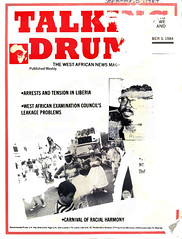A Stranger's London
On the ball
The football season is upon us. All around the country there are men waking up from their summer Saturday hibernation. For three long months they've spent Saturdays pottering about in the garden, shopping in Sainsbury, going to see mum, taking the kids to the zoo and even talking to their wives and girlfriends. Suddenly, they've come alive again; the glorious refrain of "On the Ball" will act as rays of Summer sun forcing them up and out to the public houses near the grounds where they will need other newly awoken fanatics and discuss the delights to come."Twenty-two grown men kicking a piece of leather round a field". That's one soccer hater's classic description of the noble art of Association Football and it shows how such people do not benefit from the sheer pleasure of the splendid game. You have to have romance in your heart to appreciate the beauty which is halfway between ballet and battle. You need fire in your stomach (plus three or four pints of lager and a steak and kidney pie) to feel the passion of the park. You cannot be rational about a deep emotional experience, says Robert Elms writing in a local weekly.
And already that emotional experience has landed a fan in hospital after being stabbed during the first match of the season between Everton and Liverpool. The season is, indeed, on.
Jinx history of Leyton underground
A public inquiry is to be held into the train crash near Leyton Underground Station recently, after pressure from Leyton MP, Harry Cohen.Transport Minister Lynda Chalkes agreed to the inquiry when Mr. Cohen told her it was the latest in a series along this section of line since it was opened in 1946.
- 1947, just after its opening two trains collided and a railwayman was killed.
- 1953, eight people were killed and 44 injured when two trains, crowded with
rush-hour commuters, collided in the tunnel between Leyton and Stratford stations. At that time it was London Transport's worst ever tragedy.
- January 1979, Seven people were hurt in a collision some 300 yards from Leyton station.
- 1983, a train at Leytonstone station was diverted onto a sand drag in a siding after going through a red light.
And now August 1984. Obviously no proper libation was poured before the construction and the gods are angry.
The water closet
Did you know that the water closet, which is now taken for granted, was once a subject of a great deal of legislation? Asks a consumer protection services article.The history of the WC is typically British and one fascinating fact is that to this day the water closet in Russia is called Unitaz, the trade name of a ceramic WC introduced there nearly a century ago by a British manufacturer.
The bingo war
There appears to be no let-up in the current circulation war in Fleet Street between the publishers of Britain's mass circulation tabloid newspapers. With the sudden announcement by the Sun newspaper that it had got the first winner of a million pounds (David Parsons) the accusations have been flying all over the place.The Mirror has accused the Sun of not even giving its readers a real chance to play the game since most of the readers had, by the time of the announcement of a winner, not received their cards. "How the Mirror made Parsons a winner," it claimed in a front page story the day after the announcement. The News of the World and Sun, of course, would not sit idly by while they are painted black in the eyes of their millions of readers. "The Post Office tells us they completed distribution of 23,000,000 News of the World and Sun bingo cards eight days ago," they declared, to anybody who would listen.
To settle the question as to who is really telling the readers the truth about whether it would pay out one million pounds the Mirror showed us what a million looked like in a front page picture of the money in a trolley. Now, Robert Maxwell, the Mirror publisher has taken a spot on television to tell us all about it.
Everybody is meanwhile waiting breathlessly for the first Mirror millionaire.
Carnival spirit of racial tolerance
An estimated half a million people took part in this year's two-day Notting Hill Carnival of extravagant West Indian pageantry on Sunday and Monday.As early as 12.00 noon the procession, with the splendour of a 'Mardi Gras', had started the slow march in a convoy of steel bands, musicians, dancers and, at times, on-lookers who could not resist the beat dancing to the calypso and reggae music.
But there was no doubt that the carnival, which was originally meant to be an all West Indian affair, had changed considerably over the years to become an international affair. There were more than forty bands, two of whom came from France and one from St Kitts Nevis to participate in this year's carnival which was enjoyed by tourists as a festival of entertainment.
The first carnival in London took place in 1964 under the organisation of Victor Crichlow, Frank Bynoe and Vibert Scrubbs. After a few years it began to have its ups and downs.
In 1975-76 the occasion was marred. with riots which left many policemen injured and hundreds of arrests being made and eventually resulted in the decline of the carnival and heavy policing during subsequent carnivals. But this year's chairman, Mr Alex Pascall, hoped that the carnival would contribute to the spirit of racial tolerance that is being introduced into Britain.
